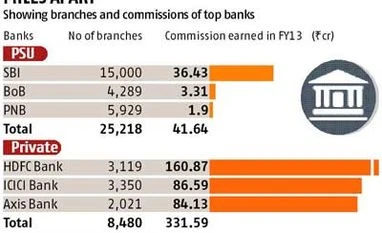Not only are public sector banks (PSBs) losing in terms of generating extra income through commissions on selling mutual funds, they appear non-serious despite the government's measures to ensure financial inclusion. And it's happening at a time when the Prime Minister’s Office (PMO) itself had to intervene a year ago to put the struggling sector in shape on a priority basis.
Recently, India's largest lender, State Bank of India (SBI), opened its 15,000th branch in Tamil Nadu. This network is double than all branches of the country's three largest private banks. On the contrary, the commissions earned by SBI through selling mutual funds were Rs 36.43 crore in 2012-13. However, in the public banking space, SBI is doing the best job in distribution of mutual funds.
Punjab National Bank (PNB), the second largest PSB, with 5,900 branches, could earn Rs 1.9 crore as commissions. Rather, the commission earned in FY13 was 11 per cent less than what the bank had the previous year. The third largest lender, Bank of Baroda (BoB), with 4,300 branches, earned Rs 3.3 crore.
HDFC Bank, ICICI Bank and Axis Bank, the three largest private lenders with 8,500 branches, managed to earn Rs 331.6 crore last financial year, eight times of what the three largest PSBs earned.

They have also lost when compared with some of single individuals who earned crores out of commissions.
An employee at a PSB told Business Standard: "Though we are allowed to sell third-party products like mutual funds, we do not. Sometimes, even our own mutual fund products do not find takers. Then, what's the point in selling others' funds?"
Added a chief executive at a fund house, in partnership with a PSB: "It's pathetic to see nationalised banks not taking aggressive steps. They need to be made experts on selling third party products — be it mutual fund or insurance. At least, they should sell their own products."
Agrees Dhruva Chatterji, senior investment consultant at Morningstar (India): "At state-owned banks, employees do not have expertise to sell mutual funds."
According to senior official at Amfi: "If top state-owned banks can bring just one investor a month (which is not a big deal) from a branch, in totality it will be a huge number every year. But it's not happening for whatever reason."
You’ve hit your limit of {{free_limit}} free articles this month.
Subscribe now for unlimited access.
Already subscribed? Log in
Subscribe to read the full story →

Smart Quarterly
₹900
3 Months
₹300/Month
Smart Essential
₹2,700
1 Year
₹225/Month
Super Saver
₹3,900
2 Years
₹162/Month
Renews automatically, cancel anytime
Here’s what’s included in our digital subscription plans
Access to Exclusive Premium Stories Online
Over 30 behind the paywall stories daily, handpicked by our editors for subscribers


Complimentary Access to The New York Times
News, Games, Cooking, Audio, Wirecutter & The Athletic
Business Standard Epaper
Digital replica of our daily newspaper — with options to read, save, and share


Curated Newsletters
Insights on markets, finance, politics, tech, and more delivered to your inbox
Market Analysis & Investment Insights
In-depth market analysis & insights with access to The Smart Investor


Archives
Repository of articles and publications dating back to 1997
Ad-free Reading
Uninterrupted reading experience with no advertisements


Seamless Access Across All Devices
Access Business Standard across devices — mobile, tablet, or PC, via web or app



)
